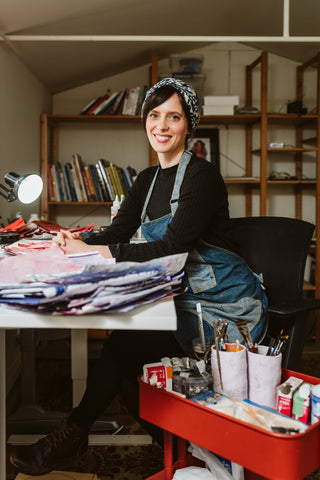WEFTshop is a social enterprise based in Sydney, Australia, and our mission is to empower women artisans to be financially free. For over a decade, we have been collaborating with the Lahu minority community, living on the Thai-Burma border as Internally Displaced People (IDPs), to create beautiful handmade applique cushion covers. In the process, we've partnered with Alice Lindstrom, an Australian illustrator, to develop unique shapes and designs for these cushions, resulting in beautiful, unique pieces that are both functional and meaningful.
WEFTshop started as a small project to help displaced women artisans and women living in refugee camps earn a sustainable income, in order to support their daily needs, especially providing food, medical help, and schooling for their children. We identified a group of Lahu women who were incredibly talented in sewing and applique techniques, which have traditionally been used in their own regional dress. However, they had little exposure to the outside market and limited access to advanced instruction; therefore, we decided to collaborate with them and uptrain their skills, teach colour-matching, pricing, and quality control to help them become self sufficient. We supported the Lahu women with supplies and equipment and trained them to manufacture their quality products that we could sell in the Australian markets.

WEFTshop wanted to create a unique collection of cushion covers and collaborate with an artist who could develop unique designs, so we reached out to Alice, who shares our values of social change and community empowerment. Alice Lindstrom is a talented collage artist who creates textured and delicate collages from layers of painted paper. Her art is inspired by diverse influences, including mid-century illustration and design, folk art, and early twentieth-century art movements. Alice loved the idea of collaborating with WEFTshop and creating designs to showcase Lahu minimalist applique technique and bring more beauty, colour, and individuality to people's homes.

To start the process of designing the cushion covers, we collaborated with Alice to create various shapes and designs. Alice generously agreed to work with us without taking a fee, which demonstrated her passion for our cause. We developed and selected the shapes from her designs that could best match the Lahu women's traditional applique designs and that our customers would love.
Next, Ya Mi, a talented and experienced Lahu artisan based in Keng Tung, Burma, began the process of cutting the applique pieces for sewing. She has been working with a sewing machine since the age of 16 and her dream is to train more women like her to be financially free by earning a decent income through their craft.
Ya Mi has taken on a new trainee, Na Yaw, who started with cutting various pieces according to the sample, and then Ya Mi took photos of each activity's different stages to share with WEFTshop in Sydney. This process of collaborating online with a team of artisans and designers in different parts of the world is how WEFTshop has been bringing creativity and innovation to our handmade products and bridging gaps to support communities.

With the cushion front and applique pieces cut, Ya Mi started to sew the appliques onto the cushion front. Each cushion cover is unique, and the process of creating them is meticulous and time-consuming. The artisans first sew the appliques on each cushion front as a single piece and then connect the back piece by matching colour, size, and shape. The zippers are attached, then it's over to pressing and bending out. Finally, the finished cushions are sent to WEFTshop in Sydney, Australia, where we photograph them and upload them to our online store for sale.

WEFTshop believes that bringing pieces of handmade art from local communities to Australian customers can build meaningful connections, nurture communities and provide empowerment to those in need. Our cushions communicate the stories of the Lahu minority and their modest yet beautiful applique technique, showcasing the talent and hard work of the women who have made them. It has been an exciting journey for both us and the Lahu artisans. Together with Alice, we have created beautiful designs, that not only serve as decorative pieces in people's homes but also show that people can change the world by bridging gaps between communities and inspiring creativity and innovation.

